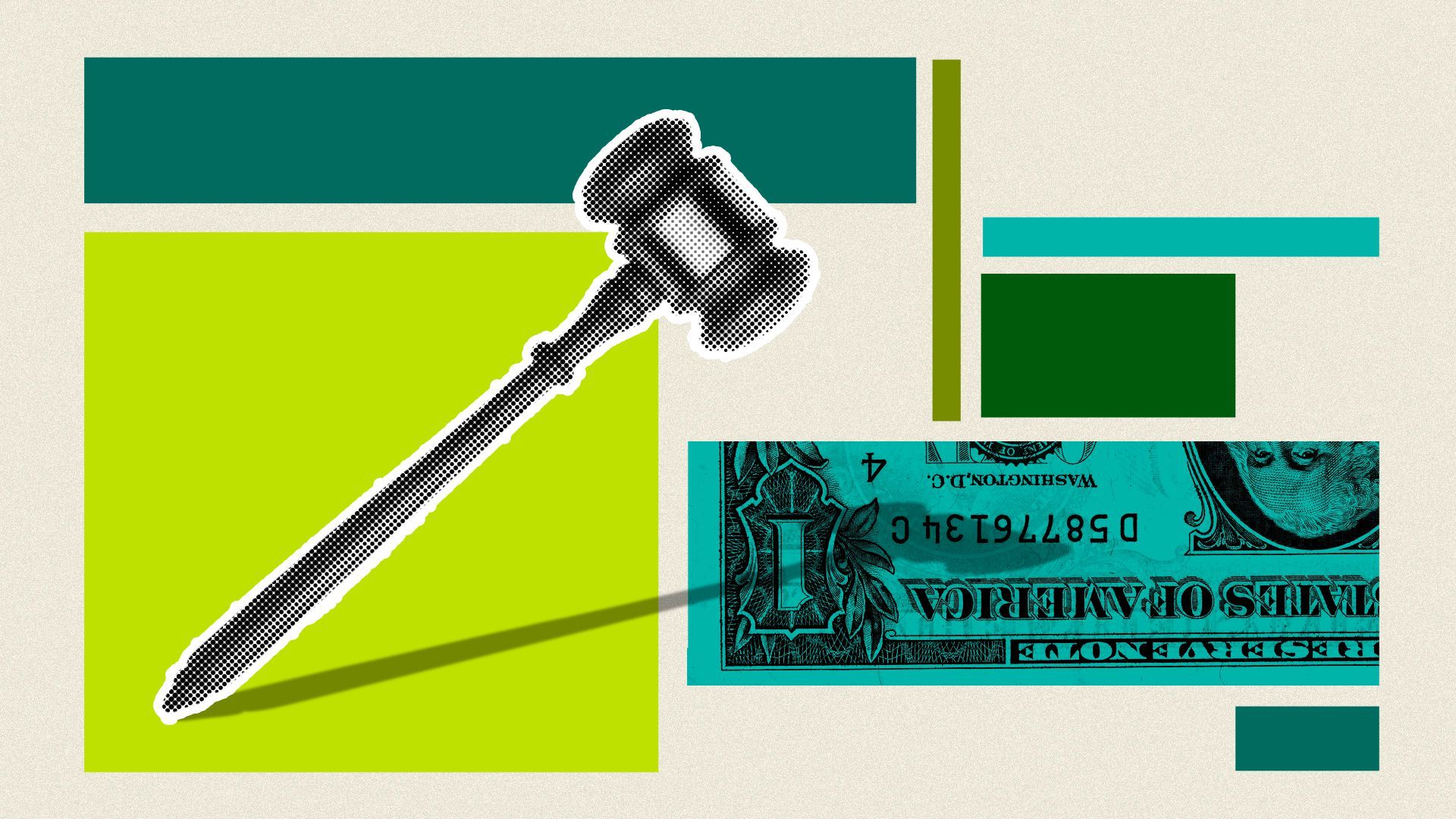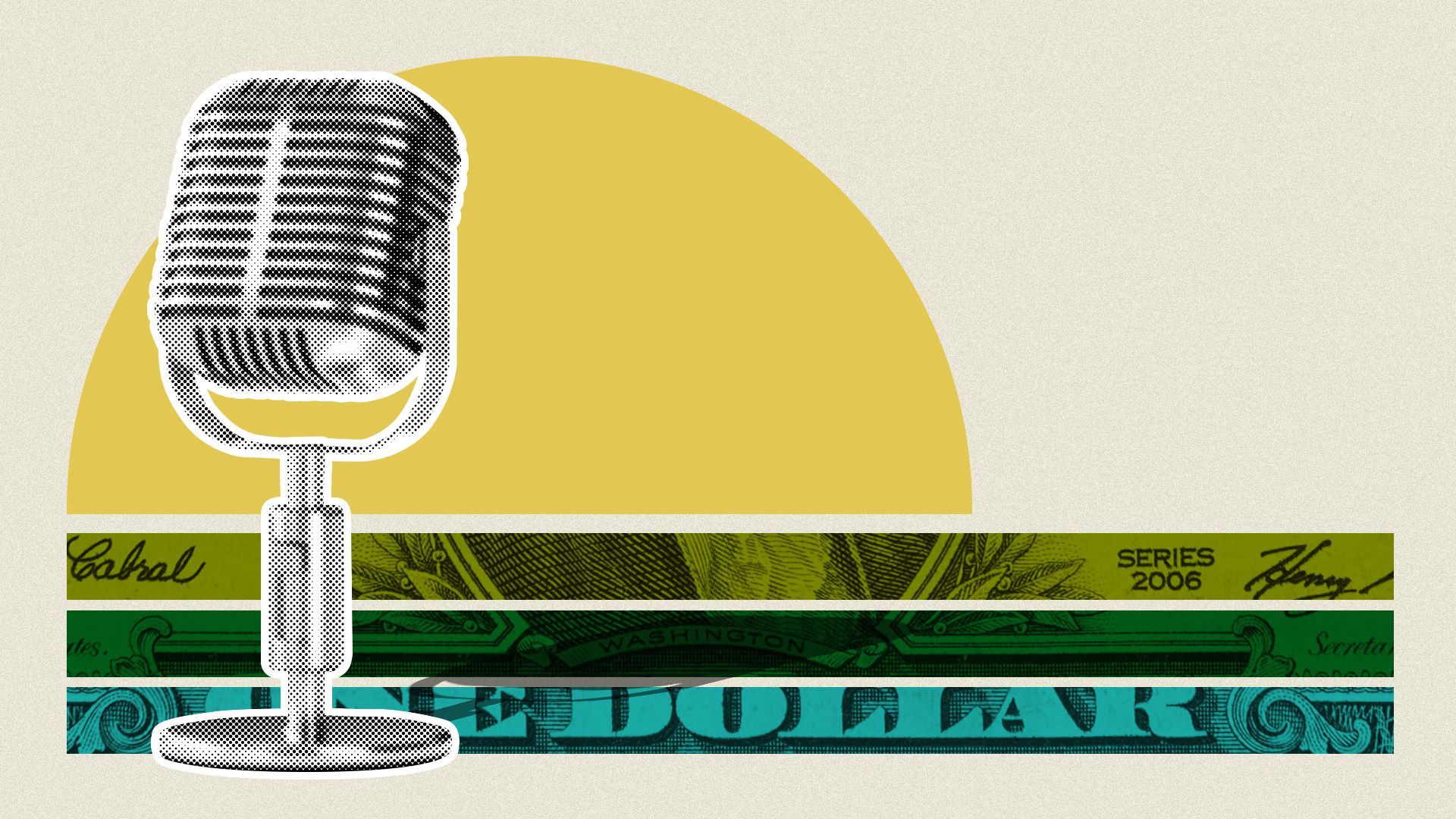| |
| |
| |
| Presented By Fidelity Investments |
| |
| Axios Pro Rata |
| By Kia Kokalitcheva ·Jul 31, 2021 |
| Welcome back to another Saturday! Find me at kia@axios.com or on Twitter @imkialikethecar. - Programming note: Since I'll be taking over Dan's daily duties for the next two weeks while he's on an island, my colleague Hope King will write next Saturday's newsletter.
- Playing on my Spotify: Oliver Cheatham's "Get Down Saturday Night" and "Finally (Cannot Hide It)" by Kelly Rowland and Amorphous.
Today's Smart Brevity™ count is 937 words, 3½ minutes. |
| |
| |
| 1 big thing: Robinhood regulatory storm ☔️ |
 |
|
| Illustration: Shoshana Gordon/Axios |
| |
| Robinhood, best known for its popular no-fee stock trading app, went public on Thursday while facing an unusually large legal and regulatory storm. Why it matters: While some challenges will likely resolve, others could seriously maim the company, forcing it to right its business ship under the scrutiny and pressures of the public markets. The big picture: The Silicon Valley company has already settled various regulatory charges and faced questions from Congress, but there's more ahead, including a probe into the fact that Robinhood's founders aren't licensed brokers. Risk radar: - "Payment for order flow," which made up 81% of Robinhood's 2021 Q1 revenue, is being examined by regulators and lawmakers alike. If banned, it could make it much harder for the company to keep offering no-fee trading.
- Cryptocurrencies, which generated 17% of Robinhood's transaction revenue, still largely live in a regulatory gray area in the U.S.
What they're saying: "Some of these issues may be dustups, but some may be fundamental challenges to the company," Chester Spatt, a Carnegie Mellon University professor and former chief economist at the U.S. Securities and Exchange Commission, tells Axios. The best case scenario: Airbnb. - The home-sharing company, which went public last fall, has battled regulation of its main business in various municipalities around the world.
- While some fights have truly threatened its presence in important markets, the company's business has fared quite well — even in the face of a long, global pandemic that halted much of our travel.
- "Gig economy" companies like Uber, Lyft and DoorDash have also managed to weather a slew of regulatory challenges to their business models during and after their respective IPOs.
The worst case scenario: Whatever is currently happening to U.S.-listed Chinese tech companies. - Beijing has been cracking down on a number of its big and successful tech companies like Ant Group and, more recently, ride-hailing giant Didi, which is in hot water for going ahead with its IPO despite regulatory objections.
- It's reportedly considering closing a legal loophole that's allowed companies in certain sectors — that are normally barred from taking foreign investment — to tap into the U.S. capital pool by going public stateside.
- Beijing also recently unveiled new laws that bar education businesses from earning profits, raising capital or going public — dashing the IPO hopes of several of its edtech companies.
The bottom line: Government scrutiny is not to be taken lightly. |
    |
| |
| |
| 2. CashCat flashback ⚡️ |
 |
|
| Illustration: Aïda Amer/Axios |
| |
| Years before it became a public company with a market capitalization of $32 billion, Robinhood was an ambitious idea to create the next generation of consumer finance apps by marrying slick design with stock trading. Oh, and it was nicknamed "CashCat," after the popular internet meme. What they're saying: "Beautiful financial [user experience] was not a thing. … There's not that many people in 2013 that were showing me something like that," says Susa Ventures general partner Chad Byers of his immediate impression meeting Robinhood's founders when they were raising seed money. - "As an investor you look for little clues that this team is going to be special," he adds of their early instinct to build a well-designed mobile app.
Backstory: Byers met with co-founders Vlad Tenev and Baiju Bhatt at Silicon Valley's famed Rosewood Hotel. At that point, they'd already seen more than 100 seed investors, and mostly gotten rejections. Between the lines: A key concept Robinhood's founders seized on was that stock trading is a consumer financial activity that people have opinions about and also discuss regularly, says Byers. No one's talking about their credit cards at dinner with friends, he adds. - "The reason it's important for the company is … it changes the [customer acquisition cost] game," he explains. "They essentially didn't pay for a customer until they had millions of customers."
|
    |
| |
| |
| 3. A crowded trading app landscape |
 |
|
| Illustration: Brendan Lynch/Axios |
| |
| Robinhood is not the only game in town when it comes to stock trading apps. - Webull: Often described as the most comparable alternative to Robinhood, the company got a boost in popularity earlier this year when some customers soured on the former. It was founded in 2017 by a former Alibaba and Xiaomi executive.
- Public.com: Also started in 2017, Public has designed its app around social features that let customers interact and talk about stocks. It similarly got a big boost this year when consumers looked for Robinhood alternatives.
- SoFi: The company has added a bevy of financial services since its early days as a college refinancing outfit. Founded in 2011, it has since expanded to several products, ranging from loans to investing.
- TD Ameritrade/Thinkorswim: An older and established brand, it offers a range of investing and trading options for new and experienced traders. TD Ameritrade was acquired last fall by Charles Schwab.
- E-Trade: Another well-known giant, it cut commissions a few years ago to compete with Robinhood's growing popularity.
- Coinbase: For crypto trading enthusiasts, this is a popular alternative. The company, founded in 2012, recently went public, and lists dozens of digital tokens on its exchange. (There is, of course, a whole universe of other crypto-only trading apps!)
|
    |
| |
| |
| A message from Fidelity Investments |
| A new fund that prioritizes opportunities in climate action |
| |
 |
| |
| The Fidelity Climate Action Fund invests in companies that are removing, reducing or mitigating the effects of climate change. Why it's important: Climate change will be one of the single largest economic drivers over the next 30 years and beyond. Learn more. |
| |
| |
| 📚 Due Diligence |
- Robinhood stumbles out of the gate (Axios)
- Robinhood's Guinea Pig for Upending Public Offerings: Itself (NYTimes)
- Robinhood CEO admits company did not respond perfectly to GameStop trading mania (Axios)
|
    |
| |
| |
| 🧩 Trivia |
| Stock trading is a global financial activity (and pastime), but Robinhood is not — yet, at least. - Question: Where did the company plan on expanding to, a few years ago? (Answer at the bottom.)
|
    |
| |
| |
| 🧮 Final Numbers |
 Data: YCharts; Chart: Axios Visuals |
    |
| |
| |
| A message from Fidelity Investments |
| A new fund that prioritizes opportunities in climate action |
| |
 |
| |
| The Fidelity Climate Action Fund invests in companies that are removing, reducing or mitigating the effects of climate change. Why it's important: Climate change will be one of the single largest economic drivers over the next 30 years and beyond. Learn more. |
| |
| 🙏 Thanks for reading! See you on Monday for Pro Rata's weekday programming, and please ask your friends, colleagues and amateur stock traders to sign up. Trivia answer: Australia. The company announced its plans to debut there, but had to scrap them. |
 | | It'll help you deliver employee communications more effectively. | | |








No comments:
Post a Comment